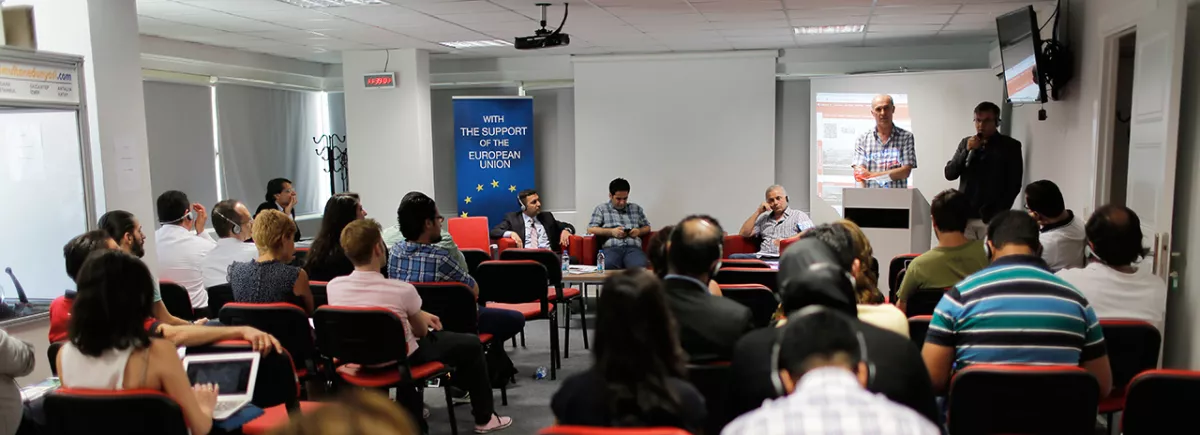
Syrian radio stations share their experiences
Related project
The Syrian media incubatorOn 21 and 22 July 2015, 13 Syrian alternative radio stations and 9 radio stations from Arab countries in the region gathered in Gaziantep (Turkey) to take part in a joint reflective process and share editorial practices between radio stations operating in conflict or post-conflict situations or in difficult transitions.
For the past four years, Syria has been one of the most dangerous regions for media professionals. Despite the growing risks owing to the proliferation of armed groups, new radio stations are being launched, initially online but also on FM, both in exile and on Syrian territory. Their creative broadcasts and the vital information they transmit, which ties in closely with the concerns of the population, are helping to give rise to a new civil society.
Over two days, 42 journalists – 32 of which were of Syrian origin – and a number of managers and consultants participated in the CFI-organised conference. The issues addressed included: 'How to broadcast on FM in conflict situations', 'What economic model to adopt to ensure independence and viability', and 'How to manage the security of reporters on the ground'.
The conference served as a means of measuring how much progress had been made, benefitting from the experience of radio stations from Yemen, Libya, Jordan, Iraq, Tunisia and the Balkans (Serbia and Bosnia), and drawing up a roadmap for the purpose of strengthening the Syrian independent media networks and helping their teams to adopt more professional practices.
"This conference was the first to be specifically
dedicated to Syrian radio stations and their role
in the current environment"
,
stressed Ali Safar, a journalist from Radio Sawt.
Joint recommendations
By the end of the two days, the participants had formulated the following joint recommendations:
For radio stations:
- Adopt a media discourse calling for civil order and insist on the need to introduce traditional values of justice;
- Unanimously adopt an ethical charter;
- Call for the setting-up of a common fund to help journalists who fall victim to disaster during the course of their professional duties; call for a focus on the rights of correspondents and employees, for working conditions to be made subject to explicit rules and for the provision of all forms of support required;
- Call for the adoption of the highest degree of transparency in relations between the radio stations and their staff, and between the radio stations and their audience, especially as regards the sources of support made available to the radio stations;
- Promote the development and roll-out of joint national media campaigns.
For financial backers:
- Improve information and communication relating to existing funds in order to promote transparency and equal access for radio stations to these funds;
- Encourage networking between media structures and active civil society structures that are supported by the donors;
- Call on donors to help to set up and support a common fund to help journalists who have suffered as a result of the war.
For partner organisations:
- Communicate with the international media to create a space for exchanging information and reports, in order to ensure that listeners from the four corners of the world are able to access information produced by the Syrian media;
- Create exchange programmes to enable journalists working in Syrian radio stations to visit international media outlets;
- Help radio stations to search for sources of self-funding.
In late September, the Syrian Media Incubator will organise and host two days of workshops on the role of the written press in Syria and more generally in conflict areas and regions undergoing difficult transitions.
Study on the New Syrian radios stations
Study on the New Syrian radios stations (arabic)


